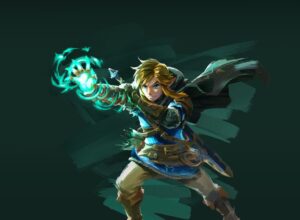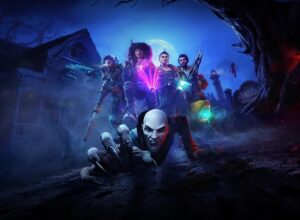Master Chief? Present. Forza? Here. Sea of Thieves? Yarr! Bethesda exclusives? You bet. So why did it feel like something was missing…?
You could argue that E3 2021 has been a bit of an open goal for Xbox.
With PlayStation still absent and some pretty dismal showings from third-party publishers – and with Bethesda now part of the Xbox family and, therefore, no longer press conference competition – it allowed Xbox (and Nintendo) to just do what they’re good at and come out looking even better than usual.
All Xbox really needed to do was show up; not bore us with filler (something it has become adept at over the past few years); give us a new release window for Halo Infinite; and show off something shiny from its Bethesda purchase. (Hello, Starfield.)
Tick. Tick. Tick. Tick. We also got the announcement of – and release date for – Forza Horizon 5, plus dates for Psychonauts 2, A Plague Tale 2, and the long-anticipated Age of Empires 4. Redfall, the in-development vampire hunting game from Arkane was a lovely bonus.
And, of course, this being Xbox, everything new and shiny will also be coming to Xbox Game Pass, its world-beating subscription service, on the day it launches.
Everything went well. It all seemed good. It was basically what we were expecting, with a few choice extras thrown on top. So why does it feel like something was missing?
https://www.youtube.com/watch?v=1YnVzOA2wNs
Ah. Yes. That must be it. For the first time in three years, Phil Spencer didn’t announce the acquisition of any additional development studios under the Xbox Game Studios publishing umbrella.
The “exclusives problem”
After the initial blush of excitement from the OG Xbox and Halo: Combat Evolved, Xbox has long been thought to have an “exclusives problem”. The likes of Halo and Gears of War still have some cachet among fans, but compared to PlayStation powerhouses like Uncharted, God of War and The Last of Us, or Nintendo’s veteran Mario and Zelda franchises, they’re just not the biggest draws.
So when console sales slowed – Xbox long since stopped publishing figures during the Xbox One generation – Microsoft’s deep pockets allowed it to change tack. The first move? Xbox Game Pass, allowing players to “binge-play” hundreds of games, both from Xbox’s own studios and other publishers, for around a tenner a month.
All of a sudden, Xbox went from not publishing console sales figures to boasting about Xbox Game Pass subscriber numbers. That was a step in the right direction for Microsoft, as while console hardware was always a loss-making endeavour, attracting users to its services and its brand is the key aim.
Game Pass made good financial sense to players, but the lack of “blockbuster” exclusives under the Xbox Game Studios banner was still seen as an emotive issue by some. All the while, Sony was building on its prestige franchises with new exclusives in the same mould, including Marvel’s Spider-Man and Ghost of Tsushima. (Not you, Days Gone.)
And so, Microsoft did the only thing it could in the situation: it opened its wallet once more, and let Xbox Game Studios go on a spending spree.
The acquisition express
Prior to 2018, Microsoft had made a few notable studio acquisitions. There was Rare in 2002, Mojang in 2014, and a number of others that were made but have since been dissolved or reassigned. (Like Bungie in 2000, which left to develop Destiny independently in 2007 once its Halo commitments were over, and Fable developer Lionhead, acquired in 2006 but shuttered in 2016.)
Then all of that changed in the run-in to E3 2018. At the Xbox press conference from the Microsoft Theater that year, Phil Spencer and the team announced the acquisition of four studios: Compulsion Games, Undead Labs, Playground Games, and Ninja Theory, developers of We Happy Few, State of Decay, Forza Horizon and Hellblade: Senua’s Sacrifice, respectively.
Later that year, Xbox would also announce the acquisition of RPG specialists InXile Entertainment and Obsidian Entertainment.
In 2019 – again, in time for a big E3 announcement – Xbox acquired Psychonauts developer and publisher of indie adventure weirdness, Double Fine Productions.
But the biggest acquisition would come in 2020, when – with no E3 for a big announcement and precious little fanfare while it awaited competition commission rulings – Microsoft bought ZeniMax Media/Bethesda Softworks for US$7.5m.
After three years of solid acquisitions, then, it felt weird for Xbox to get through its E3 2021 presentation without announcing any more purchases. But why?
Overspend, or spending over?
Xbox’s acquisition of Bethesda only went through in March of this year, once the EU had done its due diligence. You could argue that was Microsoft’s big acquisition in advance of E3 2021. And what an acquisition it is – in addition to Fallout and The Elder Scrolls, the games under the Bethesda-developed brand, it brought the following studios under the Xbox Game Studios banner:
- Alpha Dog Games – mobile games
- Arkane Studios – Dishonored, Prey, Deathloop, Redfall
- Bethesda Game Studios – Fallout, The Elder Scrolls, Starfield
- id Software – Doom, Quake
- MachineGames – Wolfenstein, Indiana Jones
- Roundhouse Studious – TBC
- Tango Gameworks – The Evil Within, Ghostwire: Tokyo
- ZeniMax Online Studios – The Elder Scrolls Online, unannounced new game
While some of those studios’ upcoming games – Deathloop, Ghostwire: Tokyo – are timed PlayStation exclusives (which Bethesda and Xbox are honouring, fair play to them), we’ve already seen that Starfield and Redfall are going to be Xbox exclusives.
It’s the beginning of a trend that Xbox head honcho Phil Spencer had warned us about. Why would Microsoft buy Bethesda if it wasn’t to try and fix the “exclusives problem” we’ve heard so much about from its detractors over the years?
It’s possible that there weren’t any new acquisitions at the Xbox E3 2021 press conference because there wasn’t enough time elapsed since the Bethesda purchase? Or maybe Xbox simply doesn’t need further acquisitions at this point in time because the once-barren exclusive cup now, suddenly, runneth over? Starfield and Redfall are quite the flex as it is, and there can only be more of that to come.
Or maybe, just maybe, Xbox blew through its pocket money buying Bethesda, and now Microsoft won’t let it spend any more until it recoups some of that outlay? Could it be that Xbox isn’t allowed to buy any more new toys until it plays with the ones it already has?
Whatever the reason behind it, it will be interesting to see if any further acquisitions are made by Xbox Game Studios in the coming years. (Maybe in time for E3 2022?)
Don’t forget to follow Thumbsticks on all the various social places you like to linger (Twitter, Facebook, Instagram, YouTube) for more video game opinion and analysis. And if you’re into E3, you should definitely bookmark our E3 2021 landing page.






